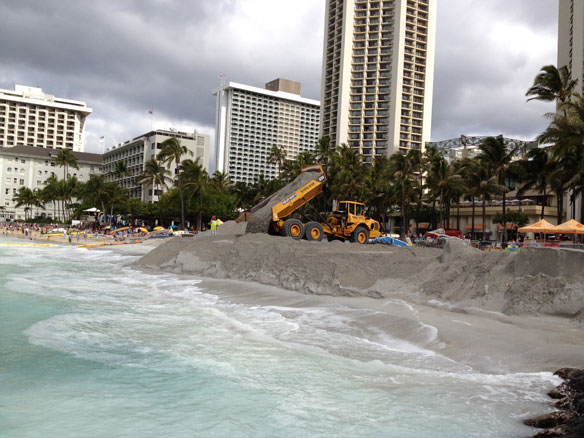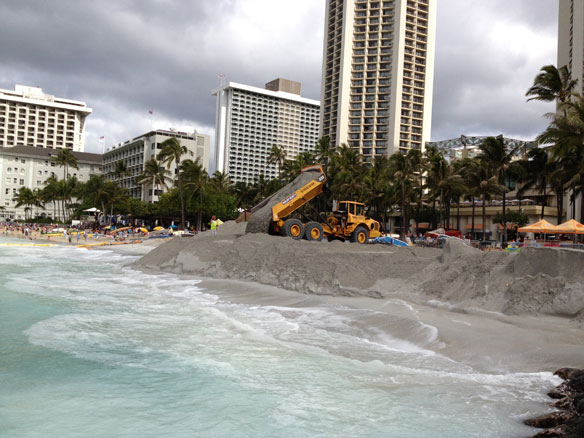
Beach-renourishement operations, Waikiki 2012. Photograph: © SAF — Coastal Care.
“Hawaii’s famed Waikiki Beach started to erode again, less than a year after the completion of a $2.2 million project to replenish the sand on about 1,730 feet of shoreline that had been suffering from chronic erosion.”Captions.
“Development is absolutely responsible for the majority of the beach nourishment,” Andrew Coburn, assistant director of The Program for the Study of Developed Shorelines at Western Carolina University, said. “Well over 99 percent of the shorelines that are nourished are developed so there is some economic value placed behind them.”
Excerpts;
Hurricane Matthew was not a megadisaster like Superstorm Sandy or Hurricane Katrina, but if precedent holds, simply rebuilding the beaches may cost federal taxpayers billions of dollars…
Read Full Article, The New York Times (10-12-2016)
Coastal geologist criticizes beach renourishment efforts; By Robert S. Young, PhD; The State (08-17-2016)
Rob Young, who heads the Program for the Study of Developed Shorelines at Western Carolina University, said the government is subsidizing coastal development with renourishment money – and that’s costing taxpayers. Communities across the country have spent millions of dollars renourishing beaches. Those efforts encourage people to rebuild after every major hurricane…
Sandy Reminds Us of Coastal Hazards, by Robert Young (10-2012)
Hurricane Matthew’s Destructive Storm Surges Hint at New Normal, National Geographic (11-10-2016)
A Beach Project Built on Sand; By Robert S. Young, PhD, in The New York Times (08-22-2014)
Coastal Barrier Resources System: Testimony of Robert S. Young, PhD; (04-07-2014)
“The Rising Sea”A Book by Orrin H. Pilkey and Robert Young
Palm Beach Mid-Town Dredge Project, A Youtube Video (02-04-2015)
“Beach nourishment projects like this have become commonplace along the US East and Gulf Coasts. These projects have immediate environmental impacts through burial of nearshore habitat and increased turbidity during project placement.The cumulative environmental impacts of doing this repeatedly on the same beach while conducting projects from Maine to Texas is unknown. But, we should be concerned. ” —Robert S. Young, PhD, Director, Program for the Study of Developed Shorelines, Professor, Coastal Geology, Western Carolina University









